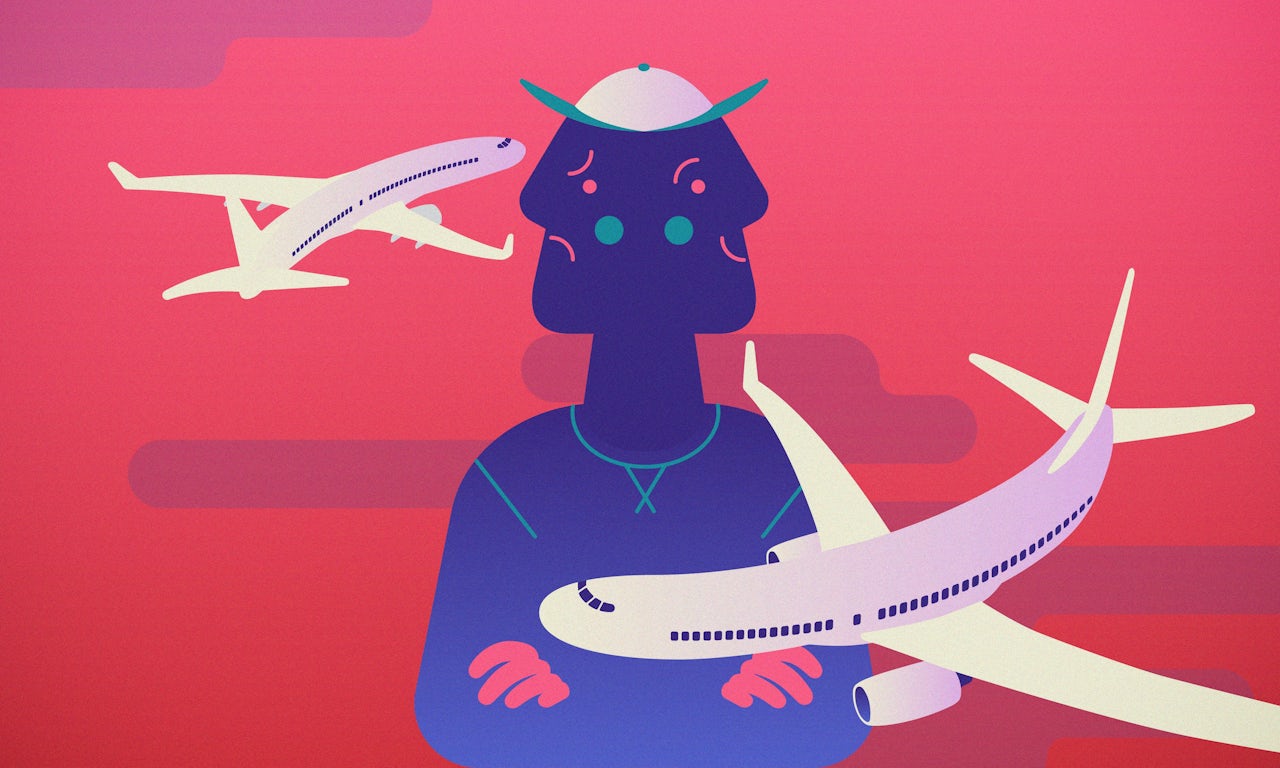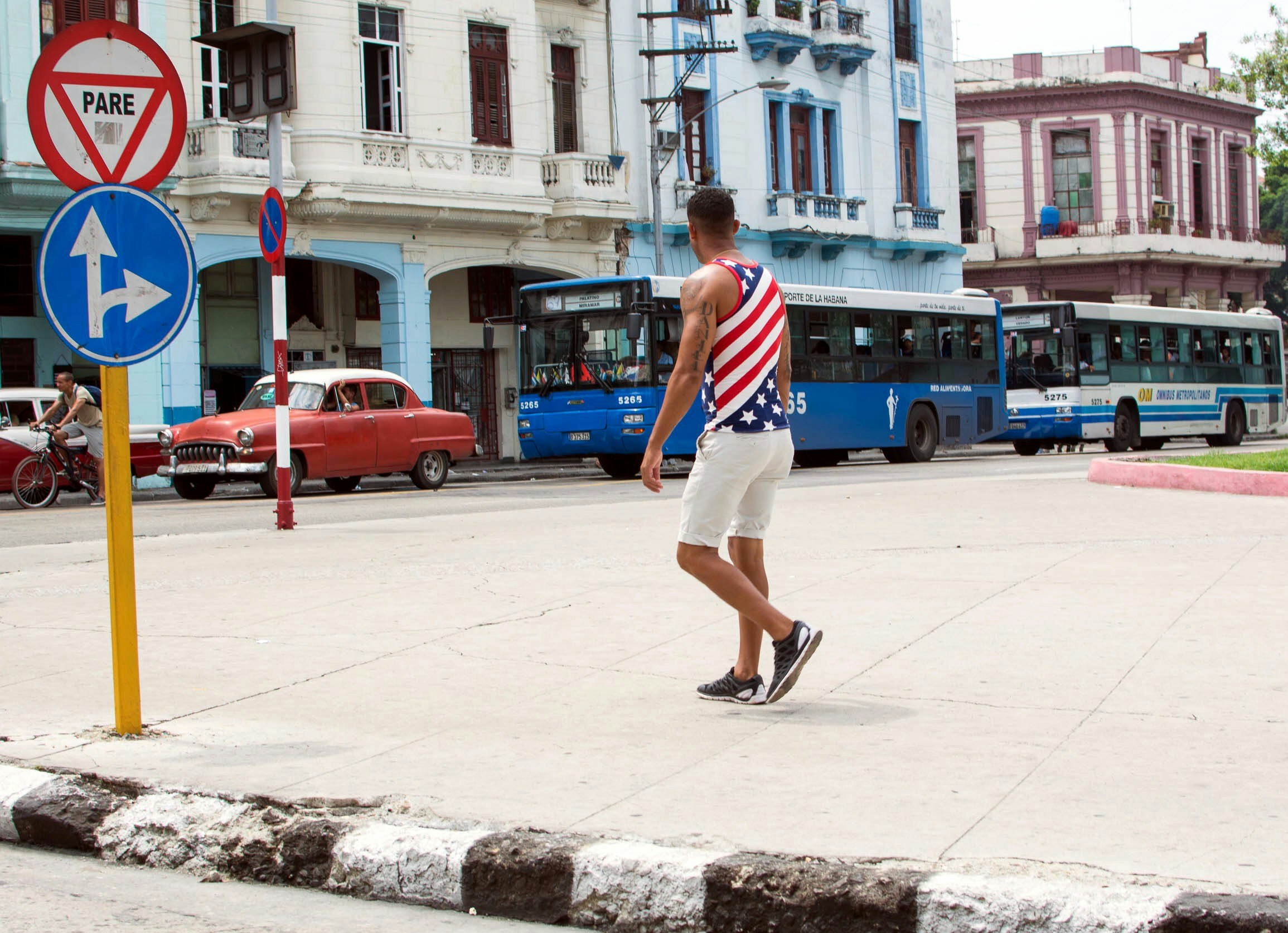When it comes to air travel in the U.S., there are two realities. Most of us — the 930 million passengers who flew out of a U.S. airport last year — think flying has never been worse. Seats keep getting smaller and closer together; seat cushions are getting thinner. Everything costs extra: bags, food, and even things we took to be basics, like seat assignments and carry-ons. Flights are something you endure with your knees pressed against the seat in front of you, feet jammed next to your backpack or purse, hoping you don’t get dragged off the plane against your will. “None of us fly by choice,” one disgruntled United passenger recently wrote in a pretty representative tweet. “Flying sucks, period.”
But there’s another group of people who see it differently: industry experts. These people say flying has never been better. It’s the cheapest it’s ever been, affordable for the majority of Americans. It’s safer. Your bags are less likely to get lost. On-time arrivals are hovering around 80 percent in recent years, the best it’s ever been. You’re likely to have honest-to-god internet on a damn plane.
So this is a conundrum. How can flying be both the best and the worst it’s ever been?
We have to get one thing out of the way. The experts are right. Flying is, objectively speaking, the best it’s ever been.
Saying that flying is the best it’s ever been, of course, requires knowing what it used to be. In the 1960s, if you or your company could afford to fly you somewhere, you’d first have to go to a travel agent or airline ticket desk. You’d buy your flight and try your best not to lose your ticket. On the day of the flight, ticket in hand, you’d get to the airport 20 minutes in advance, go through a metal detector, settle into one of your seats on an almost-never-full plane and get served a TV dinner-esque meal while sitting in seats more or less akin to today’s Amtrak arrangement. You could smoke in the last 10 or so rows, but since you’re in a giant metal tube, the entire plane reeked of cigarette smoke.
At some point, we were socialized to hate flying.
Until 1978, the federal government regulated which airlines could fly which routes and how much they could charge. Since airlines couldn’t compete on price, so they had to differentiate themselves in other ways: legroom, meals, service, blankets, and so on. Which is to say, airlines competed by making flying as comfortable as possible.
Prices were fixed not to keep flying affordable, but to keep airlines profitable. In 1974, it was literally illegal for an airline to charge less than $305, which would be $1,607 in 2017 dollars after adjusting for inflation, for a cross-country flight between New York and Los Angeles. Obviously, this meant far fewer Americans could afford it. In 1965, only 20 percent of Americans had ever flown on an airplane, and the portion that could afford it was overwhelmingly likely to be white.
As part of a surge of deregulation across the federal government, airlines were suddenly free to start competing in another way: by offering lower prices. At this point, basic supply and demand principles kicked in. Fares could be cheaper if they put more people on each plane. Meals are expensive to offer 30,000 feet in the air (one of my favorite airline cost-cutting stories: Northwest reportedly saved $500,000 a year by slicing its limes 16 ways as opposed to Delta’s 10). And, in the past 15 years in particular, major airlines merged to fend off bankruptcy and unbundled their products — remember when you could book a seat in the exit row which has more leg room for free? — and charged fees for everything.
But, even with the fees, flying is still cheaper and more accessible to the general public than it has ever been. That New York to Los Angeles flight that cost $1,607? The average fare, including first class and premium economy tickets, is now is around $700. But you can almost certainly find a flight in economy for less than $500, maybe even under $300 if you catch a sale (just yesterday Alaska Airlines ran a sale for $206 round trip). And it’s not only that one route. Overall, domestic airfares have fallen by approximately 50 percent after adjusting for inflation since deregulation in 1978. If you do want extra leg room, a meal, a checked bag, or a wider seat? That’s still there, in the form of premium economy or even first class. Looking at a random one week period in February, you can fly round-trip from New York to LA for $277, or upgrade to premium economy for $543. You could even splurge and fly JetBlue’s fantastic Mint first class for $1,117, or $500 cheaper than the legally mandated price in 1978. Which is to say: even if you purchased every perk or add-on for your New York to L.A. flight, it’s still cheaper — and better — than it was before.
With the masses being able to afford to fly, anxiety about flying was more common than straight complaining. Crashes, bad turbulence, and even hijacking used to be a common fear, which was buttressed by humor. The flying experience became a frequent target for stand-up comedians and other humorists to defuse the tension. The Friar’s Club Encyclopedia of Jokes has a section on flying one-liners featuring Bob Hope, Shelley Berman, Garry Shandling, and Howie Mandel. “I’m giving up flying,” a joke by Corbett Monica went. “I was at the airport and I saw a sign: ‘Take Out Insurance.’ I thought, if the lobby’s that dangerous, imagine what it’s like in the plane.” Many of the jokes obviously predate 9/11 — ”Ever been frisked on a plane trip? They frisk you and then, on the plane, everybody has a steak knife!” joked Shelley Berman — and tend to deal more with safety concerns instead of lack of comfort or inconvenience. Professor David McNeil, who studies comedy and satire at Dalhousie University, told me that although he doesn’t have a precise history of flying jokes, he thinks it adheres to an old Freudian theory about dealing with anxiety through humor: “We joke about flying because it scares us to death.”
After safety concerns became less prominent, comedians transitioned to joking about airline quality. In 1992, Saturday Night Live performed a skit with Jerry Seinfeld, Rob Schneider, Dana Carvey, and Adam Sandler called Stand-Up And Win, a mock Jeopardy! designed to poke fun at Seinfeldian prompts. The first question: “What’s the deal with airplane food?” (The “correct” answer from Schneider: “I know, could this stuff taste any worse? It’s like thanks but no thanks, I’m still stuffed from that huge bag of smoked almonds.”) “Airplanes” was also the first category on the board along with “cereals,” “commercials”, and “7-11 employees.” The airplane bit goes on for a bit longer:
Incidentally, this skit is also the origin of the “Why don’t they build the whole plane out of the black box?” meta-joke.
It’s also not just airline companies and their policies that make us complain, but the process of flying itself. George Carlin was more insightful than anyone, linking old school one-liners, quality complaints, and a profound insight into what flying does to the human psyche. It all comes together in a 1992 bit about the safety lecture. “This is my favorite part of the airplane ride,” Carlin sarcastically noted. “I listen very carefully to the safety lecture, especially that part where they teach us how to use” — dramatic pause — “the seat belts! Imagine this. Here we are, a plane full of grown human beings, many of us partially educated, and they’re actually taking time out to describe the intricate workings of a belt buckle.”
Unlike some of the other comedy routines, Carlin addressed a fundamental issue not with airlines specifically, but the language used during the flying process in general, an issue backed up by research. A 2007 study in the fantastically named Journal of Consumer Satisfaction, Dissatisfaction and Complaining Behavior analyzed a year’s worth of comments on Untied.com, a complaint forum for United customers, to study how powerlessness affects complaints. It shouldn’t be glossed over that to study powerlessness, researchers chose an airline complaint website; powerlessness is a fundamental part of flying. We’re told what to do while we’re herded through security, barked at by TSA officers, told where to line up by flight attendants, instructed when to turn off our phones or fasten our seatbelts and bring the tray tables into their upright and locked position, when we can get up and go to the bathroom. Pretty much everything about the process of flying is controlled by others whose positions of authority feel vaguely arbitrary (another point Carlin nails in mocking terms like “uniformed crew members” or “captain”). Short of interactions with law enforcement, flying may be the most powerless you will feel in your entire adult life.
Powerlessness matters because, as the study found, it’s one of the key triggers of complaining. “I had to vent because it was killing me to let someone get away with treating me like I was just one of a herd of cows,” one representative untied.com forum comment read. Another lamented, “I’m tired of being treated like a stupid animal by a dumb telephone answer machine.” One result of powerlessness is what the researchers termed “heightened vigilance,” which basically means we’re stuck in a negative feedback loop and primed to complain even more. The study cites two complaints that show how this might manifest: “The agent at the international check-in was rude and I feel misrouted my luggage intentionally.” The complaint went beyond “my luggage got lost” to encompass the agent’s attitude and add that the lost luggage was on purpose. Another comment: “I am not being vindictive when I say, ‘I think she [the flight attendant] had it in for me.’”
Seth Kaplan, managing partner of Airline Weekly, has a theory about why flying feels worse when it’s actually much better. His theory is that at some point, we were socialized to hate flying.
“I had to vent because it was killing me to let someone get away with treating me like I was just one of a herd of cows.”
He said, sure, people sometimes experience discomfort or annoyances, but that’s not the main reason they hate flying. Rather, people simply feel like they’re supposed to hate flying, that they’re supposed to grumble about airlines. Flying is a communal experience. We wait together, take our shoes off at security together, wait together, stuff ourselves into a metal tube together, get off as quickly as possible together, and then laugh at the jokes about how horrible it all was together.
“Complaints are rarely voiced in a vacuum,” Dr. Robin Kowalski of Clemson University wrote in a 1996 paper. Complaining is an icebreaker, she told me recently, as well as a way to one-up each other. “I definitely think there’s a social element to complaining,” she said. It didn’t take long for complaining about airplane food to become complaining about airlines in general. The bad food became the absence of bad food became TSA became less leg room became baggage fees became Dr. Dao getting dragged off the plane. And now there’s Twitter, where humor is completely bypassed. According to a Twitter marketing report, people send an average of 100,000 questions, complaints, and comments to U.S. airlines every month.
Everyone has an airline horror story. I once endured a cross-country flight in a middle seat, crammed between a bodybuilder and a gentleman of generous proportions, leaving me access to roughly 60 percent of my seat width and zero armrests. Those unpleasant experiences aren’t negated by affordability. The fact that air travel used to be expensive journeys in smoke-filled dens doesn’t make me feel any better about having my luggage lost or being trapped on the runway. But one reason there are more of those stories than ever is because more people are flying than ever. In 2016, US airlines carried 34 percent more passengers than it did in 2002. That’s an increase of 209 million passengers. To put that in perspective, in 1974, the US airline industry had 207 million passengers total. Part of what makes flying so miserable, as alluded to in some of the untied.com comments, is the scale. The more people fly, the more the industry has to scale their product and the more dehumanizing it becomes. A necessary condition of feeling like a herd of cows is the presence of a herd.
Most people understand we can’t have a first class experience on economy fares, but pine for a happy medium where we are given a seat commensurate with our dignity, treated humanely by airline staff, and generally arrive on-time barring mitigating circumstances, all for a reasonable price. That sounds nice, right?
Part of what makes flying so miserable is the scale. A necessary condition of feeling like a herd of cows is the presence of a herd.
Well, on the vast majority of the almost billion trips we take every year, I think we already have that. It’s just that we love to complain about the ones where we don’t.
Kowalski made another point in her paper. It’s a bit indirect, but I think it matters here. The more we focus on how we’re feeling, or our “internal state,” the more likely we are to complain. And boredom, it turns out, has consistently been found to increase our focus on our internal state.
If nothing else, surely we can agree on this: Flying is so boring. Everything about flying is waiting for the next thing: to get in line to board, to board, to close the door, to taxi, to take off, to land, to taxi, to open the door, to get off the plane. Flying is governed by what’s next, which means we’re always waiting. You could give me an in-flight entertainment system loaded with the entire library of human artistic achievement and I would still somehow be bored because I am on an airplane, waiting. Then I think about the fact I’m waiting. And now I’m noticing my butt’s sore. And the guy in front of me reclined his seat. And I still have three more hours to go. God, flying sure does suck, doesn’t it?








